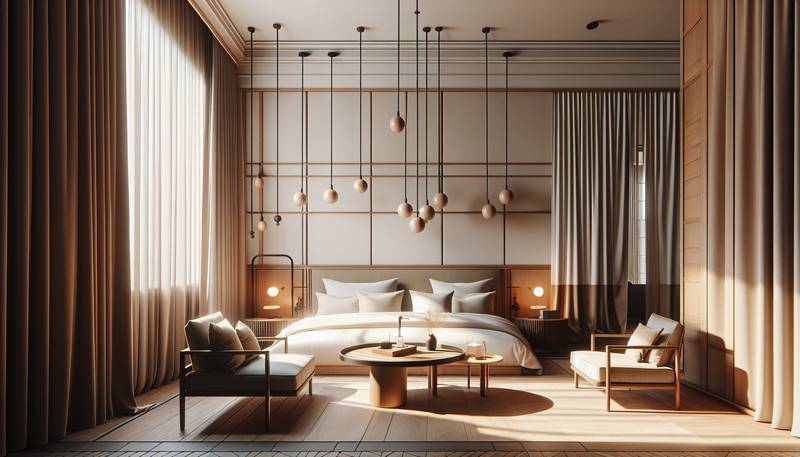Aesthetics of Minimalism in Hotel Design

Aesthetics of Minimalism in Hotel DesignThe Clean Room ConundrumThere’s an undeniable charm in the simplicity of minimalist hotel design. If one were to describe it, “a room that speaks” might come to mind—though perhaps in a soft whisper, as if trying not to disturb the tranquility of your thoughts. After all, who wouldn't want to step into a space that feels like a serene embrace, rather than a wrestling match with furniture? Gone are the days of ornate woodwork and lavish drapery that could double as a wrestling mat (if you’re that adventurous). Minimalism cuts through the clutter, providing an experience that’s as refreshing as a cool breeze on a hot summer day, minus that guy at the beach who insists on playing frisbee in your face.Cream of the Crop: Elements of MinimalismThe essence of minimalist hotel design revolves around a few key principles that can make any hotel feel like a calming retreat. Picture this:- Neutral Color Palettes: Shades of white, beige, and grey reign supreme, creating a sense of peace that feels like being wrapped in a cloud—albeit, a cloud that’s way more expensive.
- Functional Furniture: Each piece serves a purpose. No longer will you find chairs that look great but leave you questioning your life choices after thirty seconds of sitting.
- Open Spaces: Think of it as a personal space bubble. Guests can stretch like a cat after a long nap—no furniture to trip over and come out looking like a circus performer.
- Natural Light: Windows are the VIPs of minimalism. Flooding a space with sunlight not only lifts spirits but also makes it easier to locate that elusive sock you lost during your last visit.
Embracing minimalism is like attending a concert where the instruments are perfectly in tune: it’s satisfying and, more importantly, it feels good!The Art of LessWhen it comes to hotel design, less truly can be more. A minimalist approach is like choosing a single, perfectly ripe avocado over a basket of bruised ones. It showcases the beauty of simplicity and functionality. Each design decision is intentional, leading to serene environments that allow guests to unwind and recharge—without accidentally causing a concussion from dodging wall decorations.The concept extends beyond just visuals. Minimalist hotels often emphasize eco-friendliness. By reducing excess, they promote sustainability—single-use plastics have no place here, and neither do overly elaborate chandeliers that could blind a bat. This alignment with environmental consciousness resonates with guests who prefer hotels that reflect their values. Think of it as a green thumbprint on the world of hospitality.Challenges of Minimalist DesignOf course, creating a minimalist hotel isn’t all sunshine and Instagram filters. Designers face the challenge of making sure a space feels welcoming rather than stark, like an empty canvas waiting for someone to mistake it for a modern art exhibition. Too few elements can lead to an uncomfortable experience, akin to being stuck in an elevator with no music. Hoteliers must strike a balance between aesthetics and comfort. After all, guests don’t just want a bed; they want a comfy bed, preferably one that doesn’t require a degree in acrobatics to get in and out of.A Room with a View... of NothingIn minimalist hotels, the view is crucial. No one wants to stare out at a dumpster or a construction site. It’s all about curating vistas that complement the calmness of the design. Imagine lounging in a sleek, monochrome room while gazing out at a pristine beach or verdant forest—now that’s what we call a “window of opportunity!”However, some hotels take this to an art form, promoting the view of nothingness as a unique selling proposition. “Experience the freedom of a blank horizon!” they might advertise. Unfortunately, once guests arrive, they discover that horizon includes a lot of sky and… well, nothing else. But hey, at least it promotes deep thoughts!When Less Equals More: The Final WordIn a world where everything seems to constantly scream for attention, minimalist hotel design offers a quiet refuge. It reminds us that life can be uncomplicated and that sometimes, the less we demand from our surroundings, the more we can appreciate the spaces we inhabit.So, as you plan your next getaway, consider immersing yourself in the gentle world of minimalism. Who knows? You might just leave with a newfound appreciation for empty spaces and a strange desire to declutter your sock drawer. After all, in the quest for the perfect stay, less can often lead to so much more!
|
|







